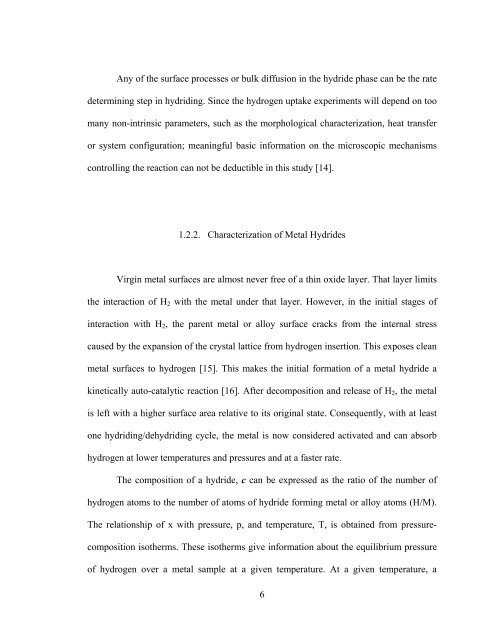You also want an ePaper? Increase the reach of your titles
YUMPU automatically turns print PDFs into web optimized ePapers that Google loves.
Any of the surface processes or bulk diffusion in the hydride phase can be the rate<br />
determining step in hydriding. Since the hydrogen uptake experiments will depend on too<br />
many non-intrinsic parameters, such as the morphological characterization, heat transfer<br />
or system configuration; meaningful basic information on the microscopic mechanisms<br />
controlling the reaction can not be deductible in this study [14].<br />
1.2.2. Characterization of Metal Hydrides<br />
Virgin metal surfaces are almost never free of a thin oxide layer. That layer limits<br />
the interaction of H 2 with the metal under that layer. However, in the initial stages of<br />
interaction with H 2 , the parent metal or alloy surface cracks from the internal stress<br />
caused by the expansion of the crystal lattice from hydrogen insertion. This exposes clean<br />
metal surfaces to hydrogen [15]. This makes the initial formation of a metal hydride a<br />
kinetically auto-catalytic reaction [16]. After decomposition and release of H 2 , the metal<br />
is left with a higher surface area relative to its original state. Consequently, with at least<br />
one hydriding/dehydriding cycle, the metal is now considered activated and can absorb<br />
hydrogen at lower temperatures and pressures and at a faster rate.<br />
The composition of a hydride, c can be expressed as the ratio of the number of<br />
hydrogen atoms to the number of atoms of hydride forming metal or alloy atoms (H/M).<br />
The relationship of x with pressure, p, and temperature, T, is obtained from pressurecomposition<br />
isotherms. These isotherms give information about the equilibrium pressure<br />
of hydrogen over a metal sample at a given temperature. At a given temperature, a<br />
6



